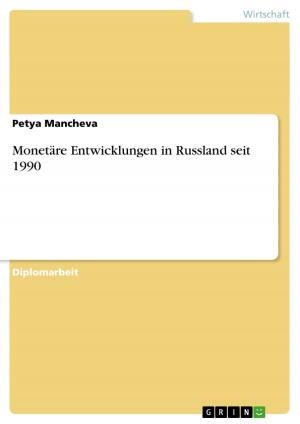The presence of memories in Jonathan Safran Foer's 'Everything is Illuminated'
Nonfiction, Entertainment, Drama, Anthologies| Author: | Virginie Vökler | ISBN: | 9783638828871 |
| Publisher: | GRIN Verlag | Publication: | July 13, 2007 |
| Imprint: | GRIN Verlag | Language: | English |
| Author: | Virginie Vökler |
| ISBN: | 9783638828871 |
| Publisher: | GRIN Verlag |
| Publication: | July 13, 2007 |
| Imprint: | GRIN Verlag |
| Language: | English |
Seminar paper from the year 2007 in the subject American Studies - Literature, grade: 1,0, University of Rostock (Amerikanistik/ Anglistik), course: Global Plots: Transnationality in Contemporary American Literature, 10 entries in the bibliography, language: English, abstract: The haunting ghost of history can be found everywhere in our existence. The past might be gone but the memory of it will stay alive in peoples minds, history books, museums, and in the developing society as well. One can recognise that a lot of people try to keep their memories of the past alive - in one or the other way. Some go through family photos while listening to their grandparents telling stories about the past, others take photos and videos themselves to preserve their own memories. Also attending history class in school, watching television programs about the past or reading books with that topic are a way of learning about the personal heritage. During their work on popular history making Rosenzweig and Thelen discoursed, that a high percentage of the people, asked about their experience of handling past and heritage, visit museums or historic sites to find a path back to their ancestors or national identity. Many also collect anything related to the past, which includes everything one can imagine - from photos, personal belongings of family members to antique china or souvenirs from places reminding them of past events. While recollecting their past people have different motives for their searching, some just want to find their own roots creating a family tree, others are more interested in their national identity and the history of the country they live in. A few start to write a journal or diary to remember things, which happened to them or others. Most of them are interested in finding where they come from, meaning not only their nationality but also the religious community and culture they originally come from and their family heritage. Children are shaped by their parents either in a good or bad way, people can learn from other family members, friends, society, historical events and the memories passed on to them by older generations, so that they become who they are. Memories are carried along a life time and are passed over to the following generations to keep them alive - sometimes they are only very personal memories, which are passed on to the next generation. Other memories influence not only one person, but a whole generation, like war. Here collective memories about past events spread over a bigger audience of people, who try to cope with them in different ways - some pass information on so that people, who were not there know what happened, while others want to forget and never mention it again, because it hurts to remember or they feel guilty, ashamed or regret to what has happened in the past. Altogether it is to say that memories in any ways are important for finding yourself and to develop your own identity.
Seminar paper from the year 2007 in the subject American Studies - Literature, grade: 1,0, University of Rostock (Amerikanistik/ Anglistik), course: Global Plots: Transnationality in Contemporary American Literature, 10 entries in the bibliography, language: English, abstract: The haunting ghost of history can be found everywhere in our existence. The past might be gone but the memory of it will stay alive in peoples minds, history books, museums, and in the developing society as well. One can recognise that a lot of people try to keep their memories of the past alive - in one or the other way. Some go through family photos while listening to their grandparents telling stories about the past, others take photos and videos themselves to preserve their own memories. Also attending history class in school, watching television programs about the past or reading books with that topic are a way of learning about the personal heritage. During their work on popular history making Rosenzweig and Thelen discoursed, that a high percentage of the people, asked about their experience of handling past and heritage, visit museums or historic sites to find a path back to their ancestors or national identity. Many also collect anything related to the past, which includes everything one can imagine - from photos, personal belongings of family members to antique china or souvenirs from places reminding them of past events. While recollecting their past people have different motives for their searching, some just want to find their own roots creating a family tree, others are more interested in their national identity and the history of the country they live in. A few start to write a journal or diary to remember things, which happened to them or others. Most of them are interested in finding where they come from, meaning not only their nationality but also the religious community and culture they originally come from and their family heritage. Children are shaped by their parents either in a good or bad way, people can learn from other family members, friends, society, historical events and the memories passed on to them by older generations, so that they become who they are. Memories are carried along a life time and are passed over to the following generations to keep them alive - sometimes they are only very personal memories, which are passed on to the next generation. Other memories influence not only one person, but a whole generation, like war. Here collective memories about past events spread over a bigger audience of people, who try to cope with them in different ways - some pass information on so that people, who were not there know what happened, while others want to forget and never mention it again, because it hurts to remember or they feel guilty, ashamed or regret to what has happened in the past. Altogether it is to say that memories in any ways are important for finding yourself and to develop your own identity.















